Hosting Quota Notifications For WHMCS
Contents |
About Hosting Quota Notifications For WHMCS
| Hosting Quota Notifications For WHMCS allows to define rules on clients' services bandwidth and disk usage limits according to which automatic email notifications can be sent and tickets opened to let the clients know they have exceed the previously set service usage. Prepare ticket templates and their translations, use default email template or prepare your custom ones. |
- Module:
| ✔ Send Automated Notifications To Clients When They Exceed Defined Bandwidth And Disk Usage: |
| ✔ By Email |
| ✔ By Ticket |
| ✔ Configure Notification Rules: |
| ✔ Enable/Disable Notification Rules |
| ✔ Choose Between Two Types Of Overages Calculation: |
| ✔ Tiered - Define Tiers Of Resource Usage |
| ✔ Fixed - Define Resource Usage In Specific Time Periods |
| ✔ Assign Multiple Products To Single Notification Rule |
| ✔ Assign Default Email Template |
| ✔ Define Hours Interval Of Notification |
| ✔ Configure Steps Per Disk And Bandwidth Rule: |
| ✔ Define Resource Overage Values: |
| ✔ In Specific Unit (MB, GB, TB) |
| ✔ Based On Percentage Value Of WHMCS Soft Limit |
| ✔ Assign Email And Ticket Templates Per Notification Rule Step |
| ✔ Define Time Period Of Overage Calculation For Fixed Rule Step |
| ✔ Define Action Taken Upon Resource Value Exceeding: |
| ✔ None |
| ✔ Auto-Suspend Product |
| ✔ Auto-Terminate Product |
| ✔ Configure Ticket Templates In Multiple Languages |
| ✔ View Daily Usage Of Specific Service |
| ✔ View Today, Last Week And Last Month Statistics Of: |
| ✔ Sent Email Notifications |
| ✔ Opened Tickets |
| ✔ Suspended Services |
| ✔ Terminated Services |
| ✔ View Logs Of Sent Notifications, Opened Tickets And Performed Actions |
- General Info:
| ✔ Multi-Language Support |
| ✔ Supports PHP 5.6 Up To PHP 7.3 |
| ✔ Supports WHMCS V7.7 And Later |
| ✔ Easy Module Upgrade To Open Source Version |
Installation
| This tutorial will show you how to successfully install and configure Hosting Quota Notifications For WHMCS. We will guide you step by step through the whole installation and configuration process. |
Installation
| 1. Log in to our client area and download the module. |
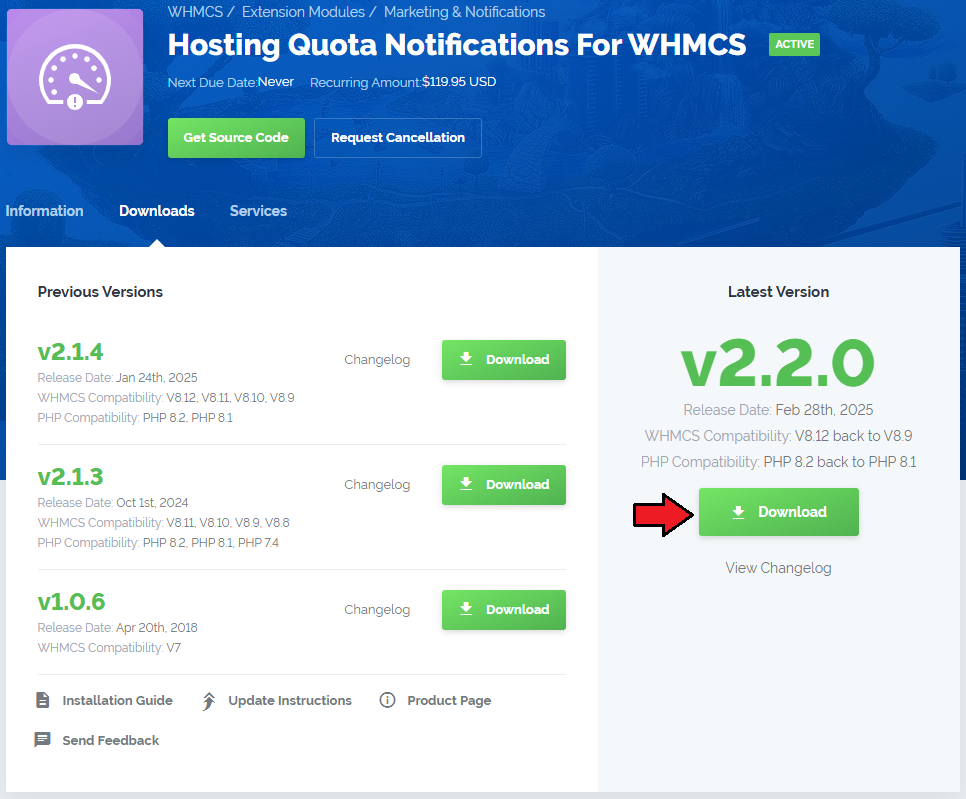
|
| 2. In the downloaded file you might find one or two packages that support different PHP versions. In the most recent versions of the module, you will find only one package that supports PHP 7.1 and later. |
| Previous updates of the module may contain two packages dedicated to various PHP versions. The first one that supports PHP 5.6 up to PHP 7.0, and the second one addressed to PHP 7.1 up to PHP 7.3. |

|
| Important: This situation does not affect the open source version of this module which can be applied to any PHP from version 5.6 and later. Note: You can check the current PHP version in your WHMCS. To do so, proceed to 'Utilities' → 'System' → 'PHP Info'. |
| 3. Once you have chosen the package with the right PHP version, extract it and upload its content into the main WHMCS directory. The content of the chosen PHP version files to upload should look like this. |
| 4. When you install Hosting Quota Notifications For WHMCS for the first time you have to rename the 'license_RENAME.php' file. The file is located in 'modules/addons/hosting_quota_notifications/license_RENAME.php' . Rename it from 'license_RENAME.php' to 'license.php' . |
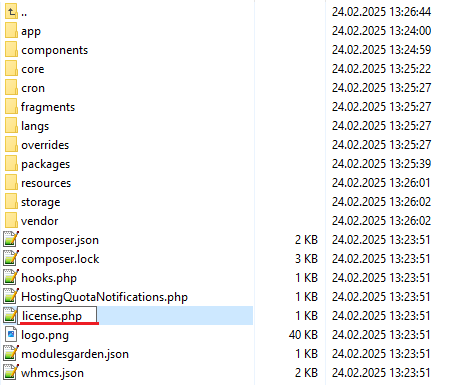
|
| 5. In order to configure your license key, you have to edit the previously renamed 'license.php' file. Enter your license key between quotation marks as presented on the following screen. You can find your license key in our client area → 'My Products' . |

|
| 6. In the next step, set up the 'storage' folder as recursively writable. This folder is available at 'yourWHMCS/modules/addons/hosting_quota_notifications/'. |
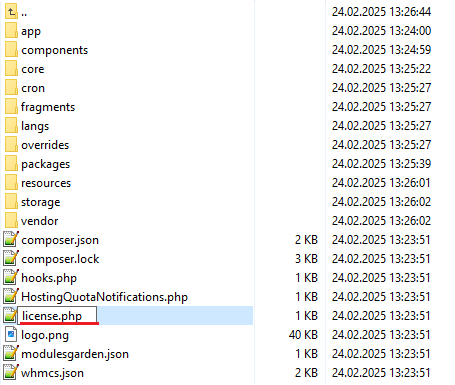
|
Configuration of Addon
| 7. Now you have to activate the module in your WHMCS system. Log in to your WHMCS admin area. Go to 'Setup' → 'Addon Modules' . Afterwards, find 'Hosting Quota Notifications' and press 'Activate' button. |
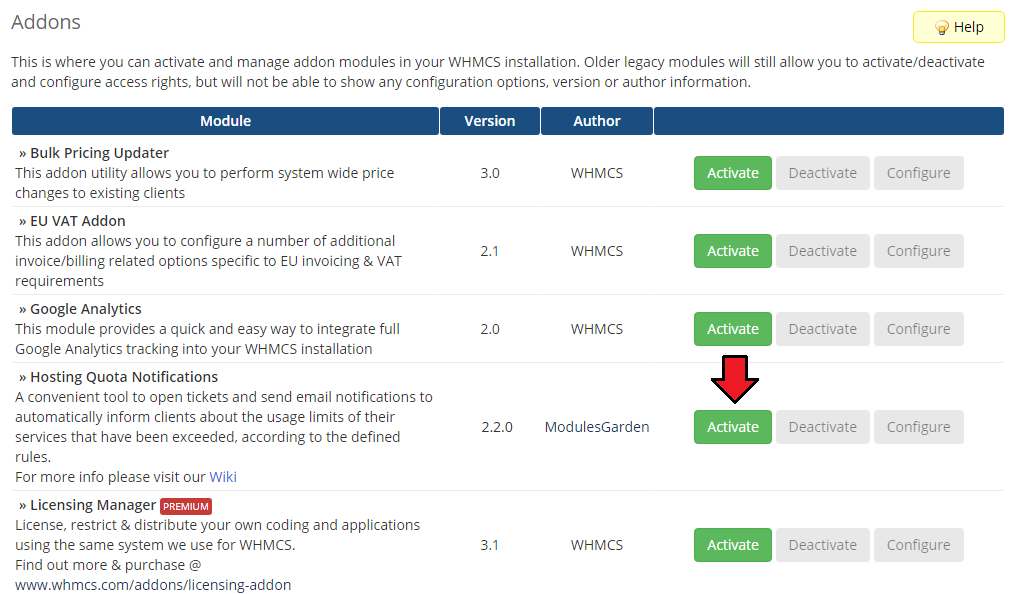
|
| 8. In the next step you need to permit access to this module. To do so click on 'Configure' button, tick 'Access Control' near required admin role groups and press 'Save Changes'. |
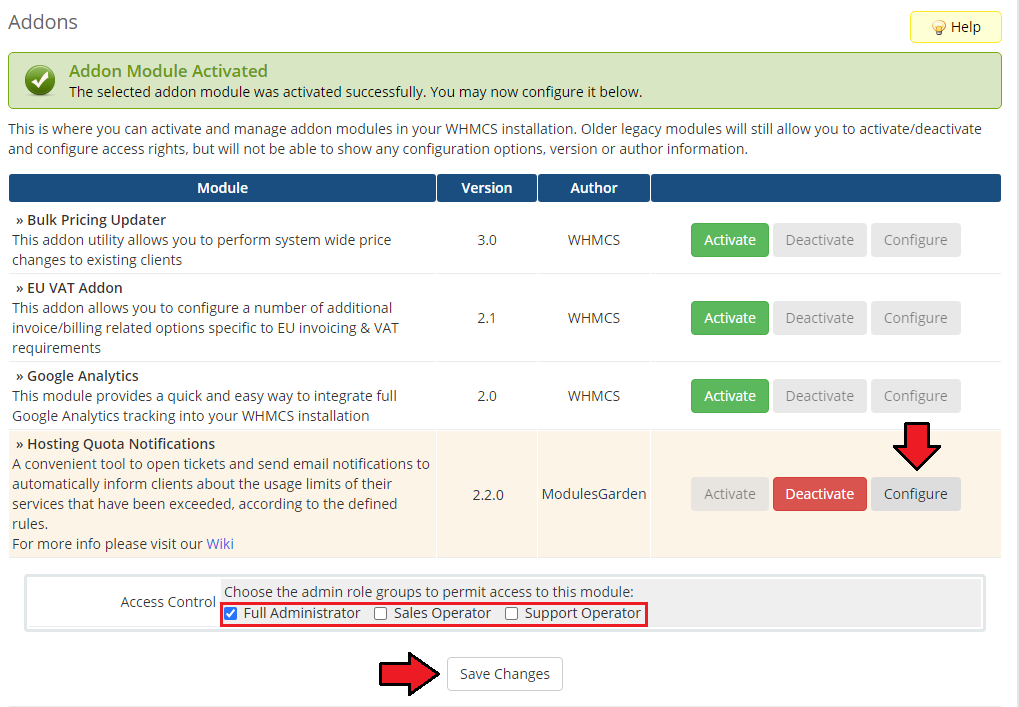
|
| 9. You have just successfully installed Hosting Quota Notifications For WHMCS! You can access your module at 'Addons' → 'Hosting Quota Notifications'. |
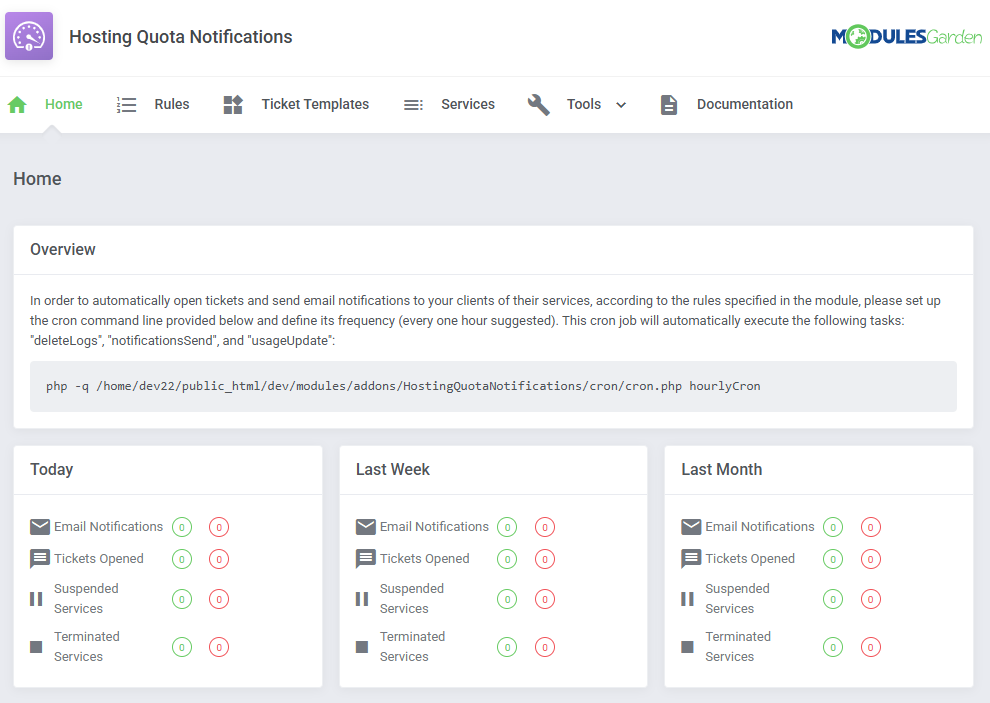
|
| 10. The last thing you still need to do before starting to use the module with its full potential is setting up a cron command line. You will find the cron line in the addon 'Home' page. One hour interval is suggested (due to hourly sent notifications). |
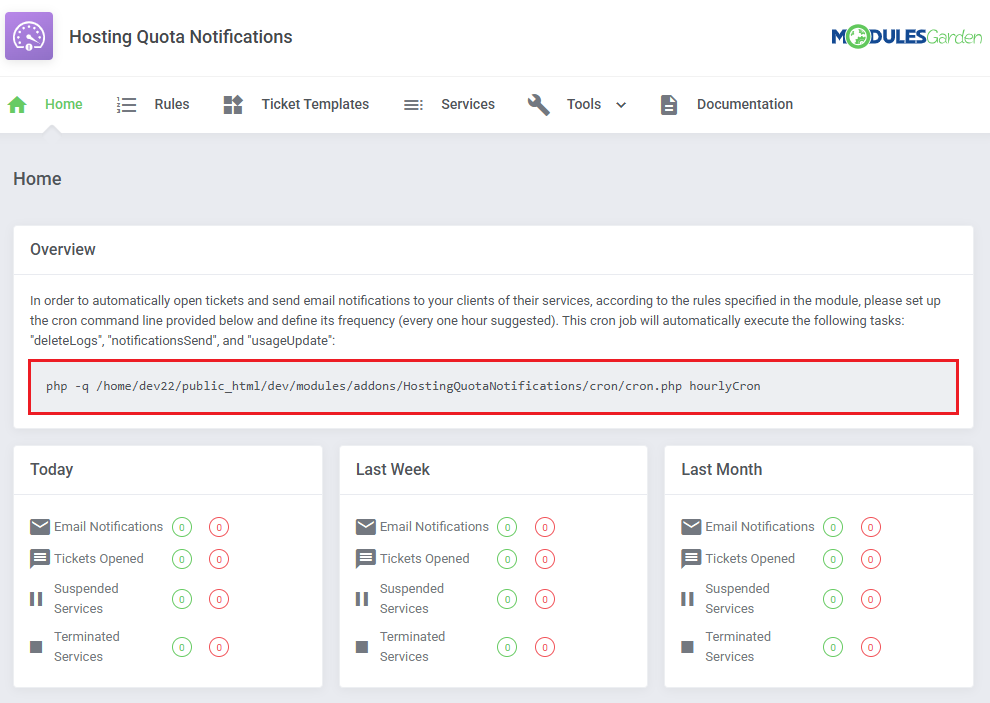
|
Configuration and Management
| In this section we will show you how to properly set up and use Hosting Quota Notifications For WHMCS to its full potential. |
Home
Dashboard of the addon includes statistics on the module actions attempts, either successful or failed.
|
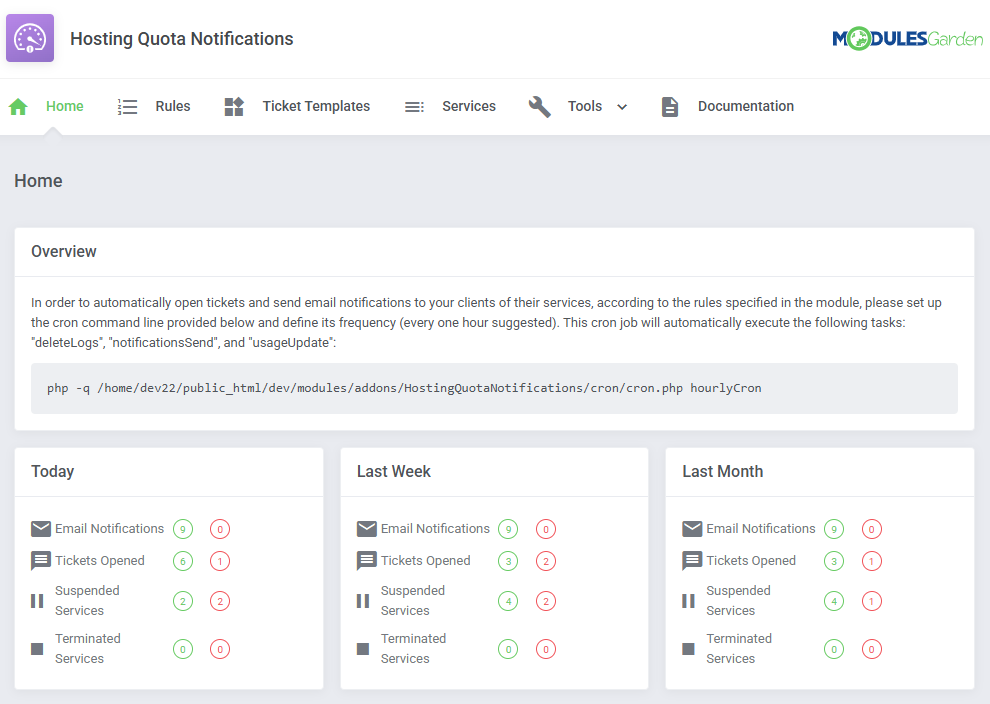
|
Rules
| This is a primary section which allows to create numerous rules according to which the services resource usage will be monitored and calculated and then adequate notifications sent. |
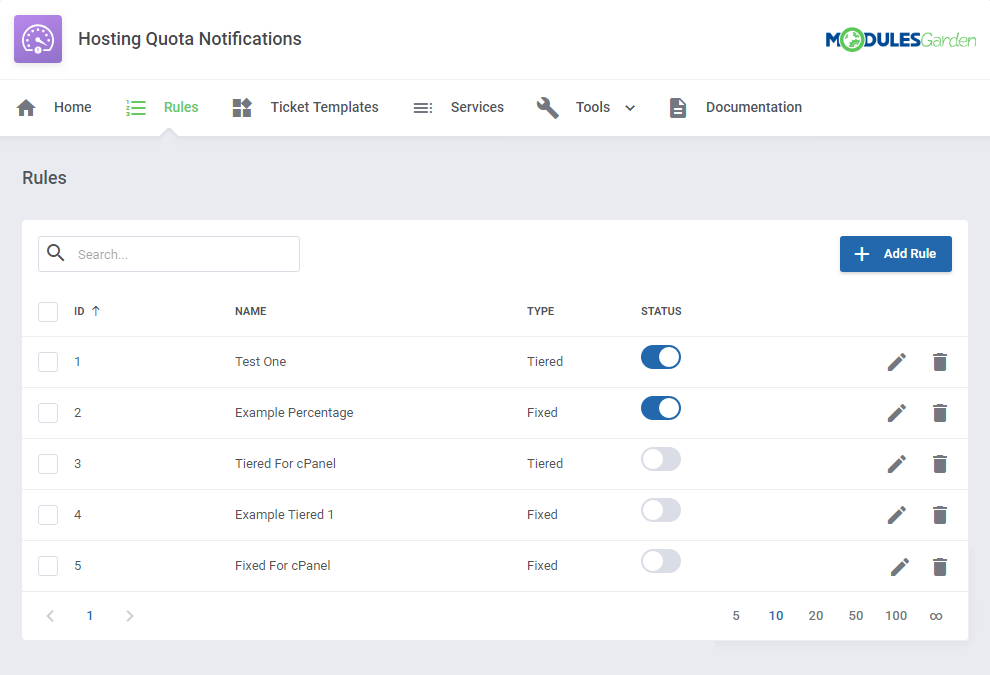
|
Rule Configuration
| Let us begin with creating an exemplary rule according to which disk usage of selected service will be checked. Press 'Add Rule'. |
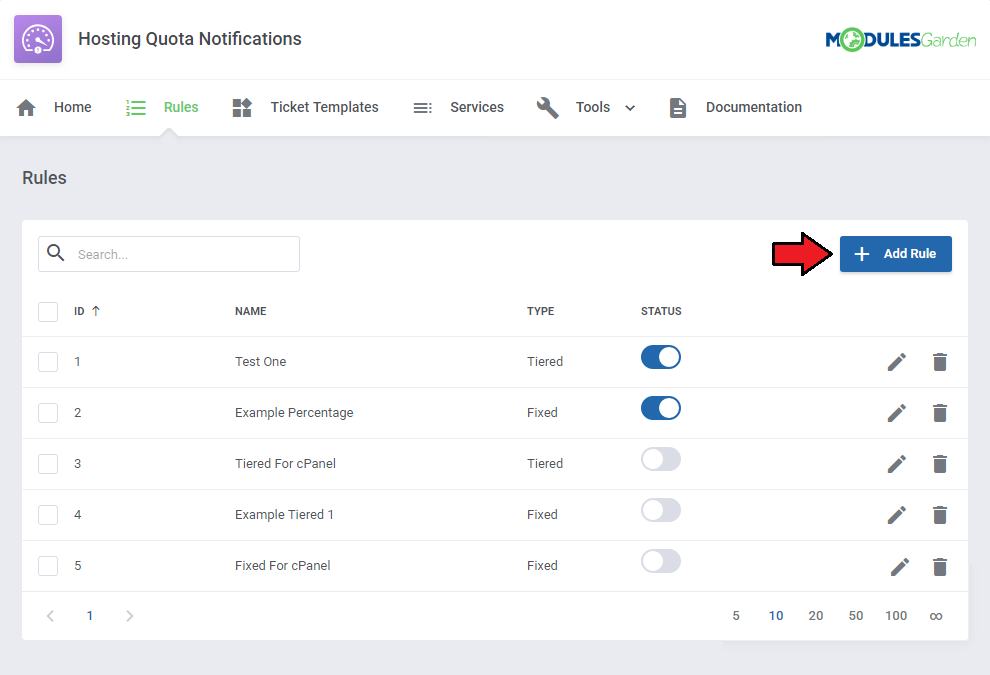
|
| Start with typing a custom name, selecting the usage calculating type: 'Tiered' or 'Fixed' (read more about these two methods here). Select your products that this rule will cover. |
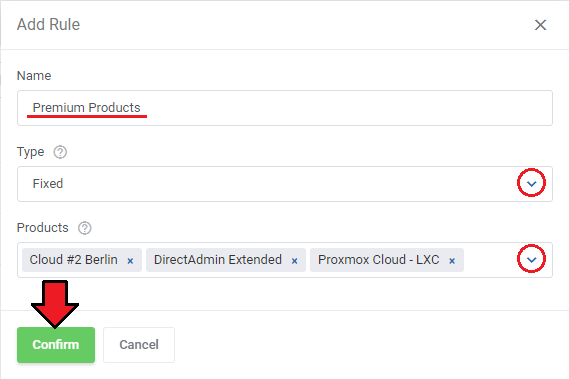
|
| Once you have saved the changes, you will be moved to the rule configuration page. Here you may:
Save the changes when ready. |
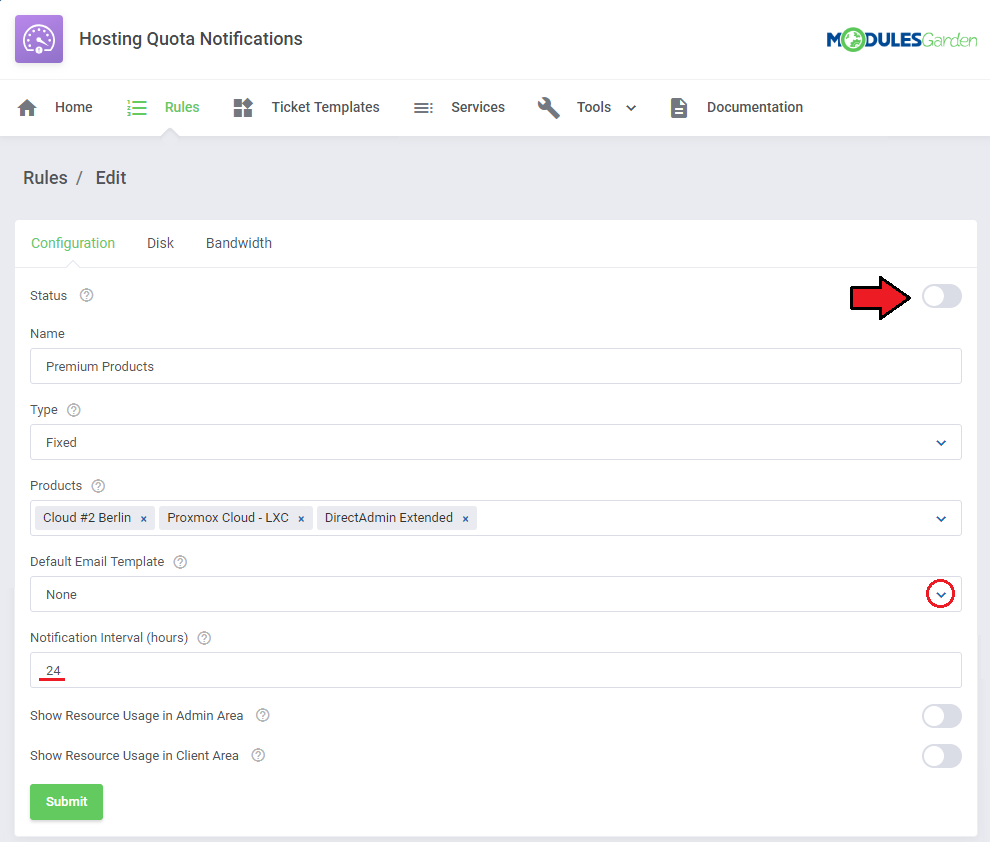
|
Steps Configuration
| Move to the next tab - 'Disk' to define steps conforming to which the usage will be verified. Press 'Add Step' to begin. |
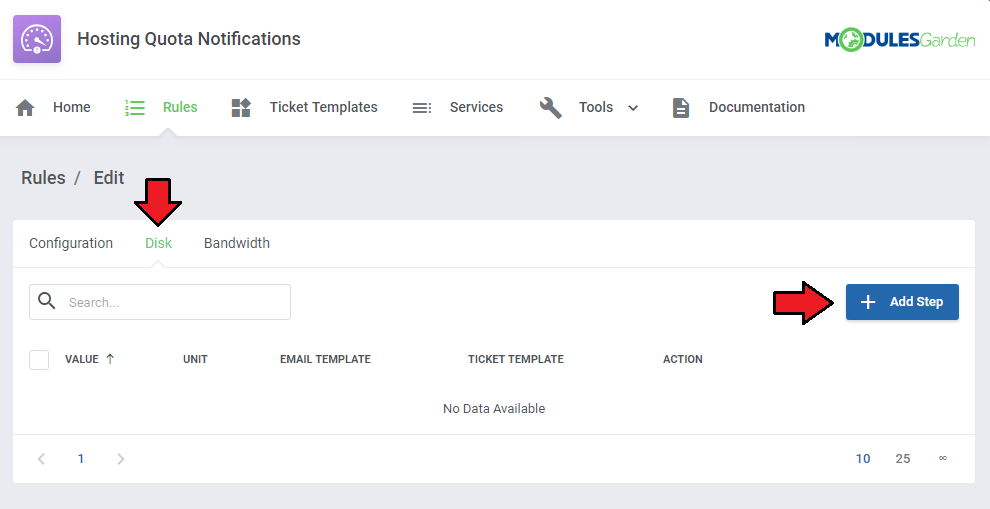
|
|
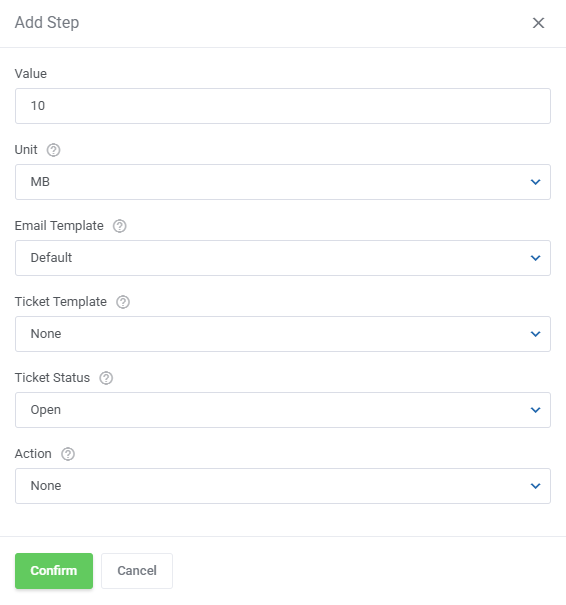
|
| Surely, you may add more steps for the same rule and force different actions on the services. You may edit the steps if needed or delete. |
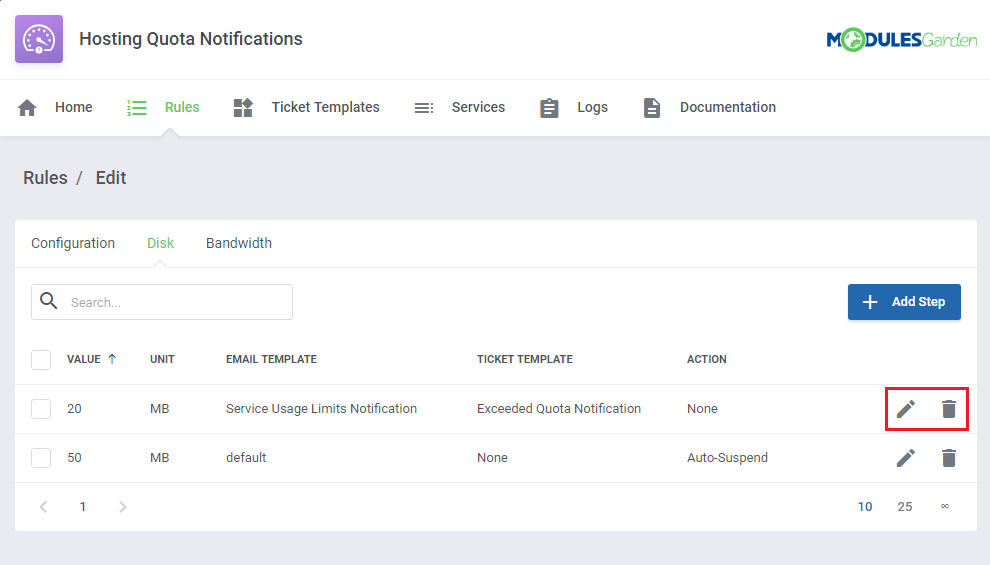
|
| Configure the steps for 'Bandwidth' usage limits in the very same way as in case of the described above 'Disk'. |
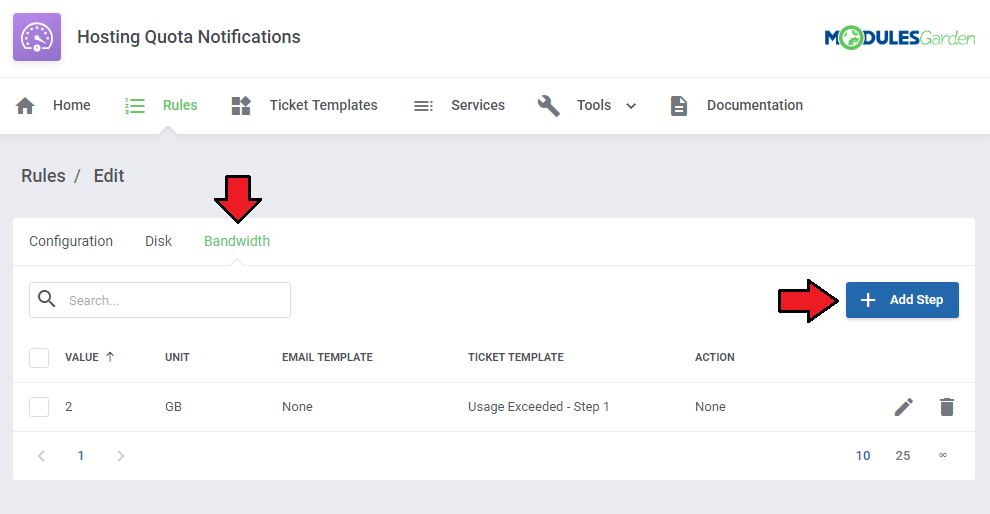
|
Calculation Methods
As mentioned above, here are two calculation types available: 'Fixed' and 'Tiered'. We will try to explain now the main differences between them and show an example of a full calculation.
|
| Take a look at the table below to see the differences between the two types. |
| Day | Usage |
|---|---|
| Day 1 | 10 MB |
| Day 2 | 20 MB |
| Day 3 | 10 MB |
| Day 4 | 5 MB |
|
|
Apart from the calculation type, you must also select a unit - MB, GB, TB or percentage.
|
Ticket Templates
| Ticket Templates section gives you the opportunity to create as many templates that will be used to open informative tickets as needed. Press 'Add Ticket Template' to create one. |
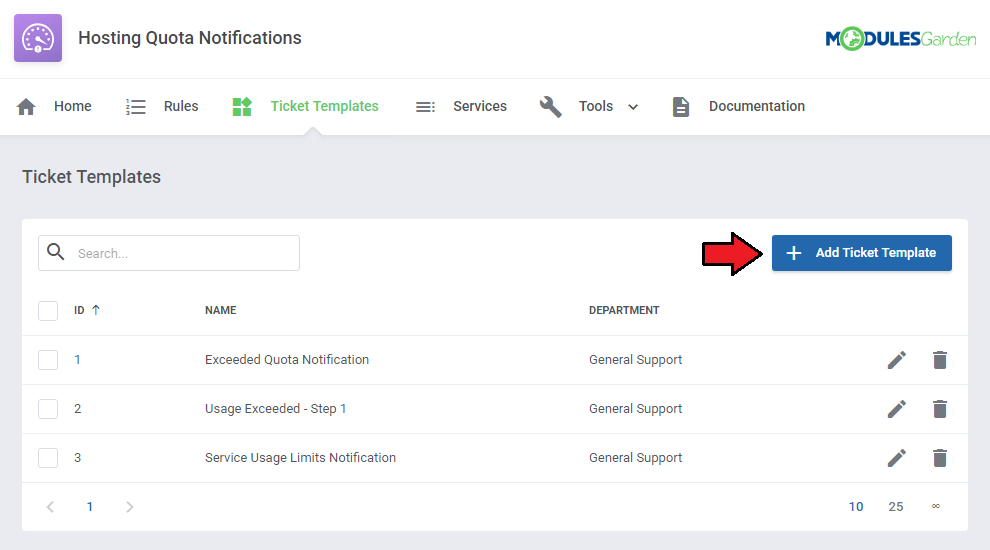
|
| Type in the ticket template name, select a support department and support administrator to which the ticket will be automatically assigned. Save changes. |
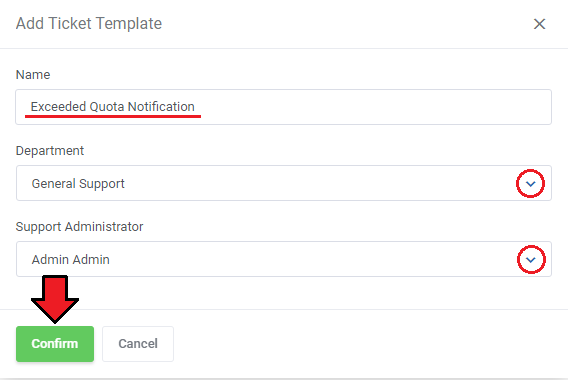
|
| You will be immediately moved to the template configuration page where you can again rename it and change the department. |
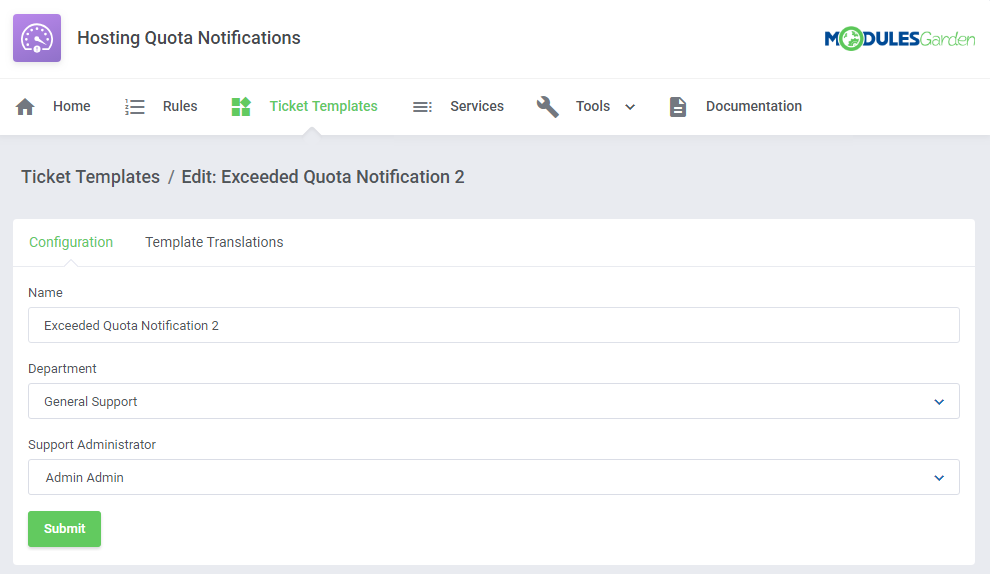
|
Ticket Template Translations
| Next, you need to proceed to the 'Template Translation' section. There you can provide the content of the template. Press 'Add Template Translation'. |
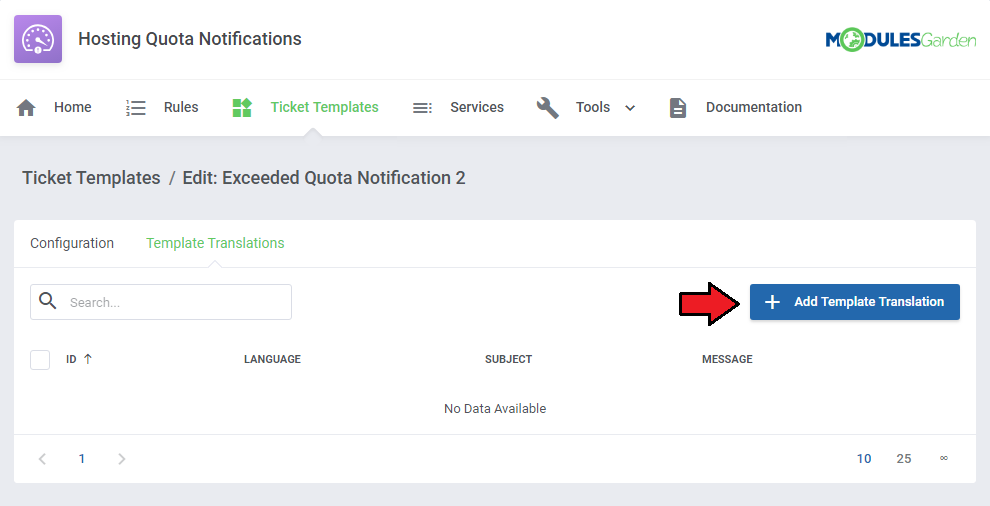
|
| Enter the template name, select language and type in the text in the 'Message' text field. If you select default language, then this template will be used in case there is no translation in the client's language. |
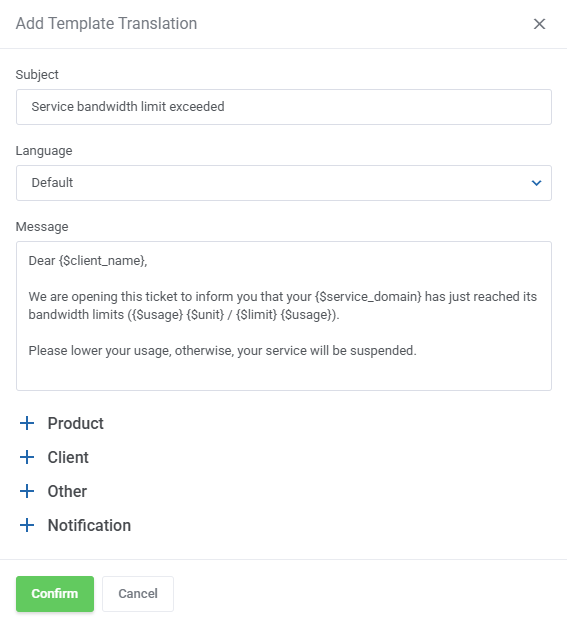
|
| There are numerous merge fields that you may use in the message to make it full and most informative. As you can see, at the bottom there is a list of special merge fields specially designated for notifications. These are:
|
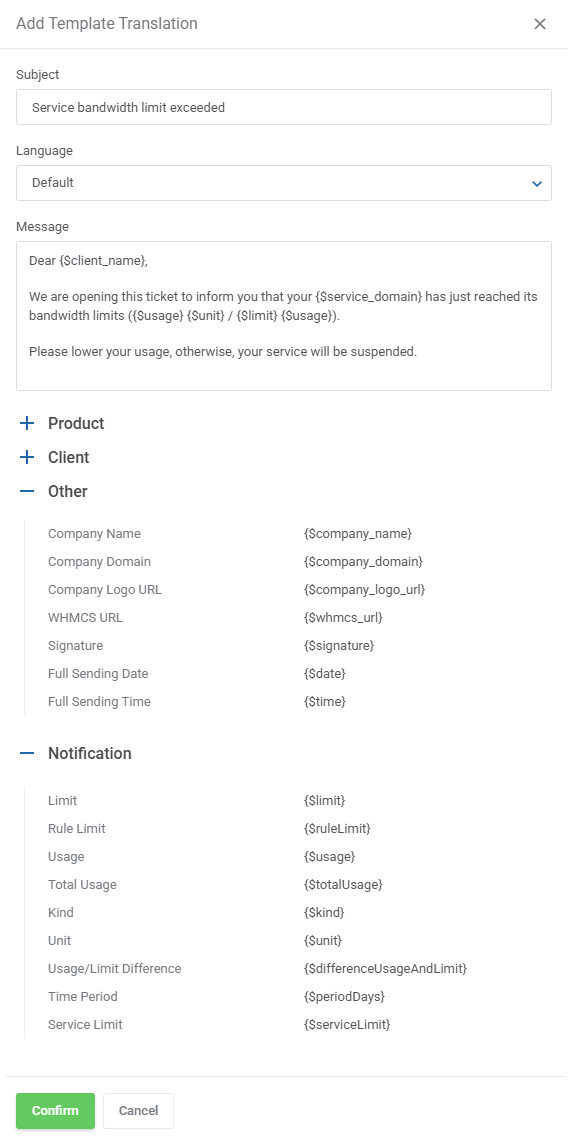
|
| Use action buttons to edit or delete the template translations. |
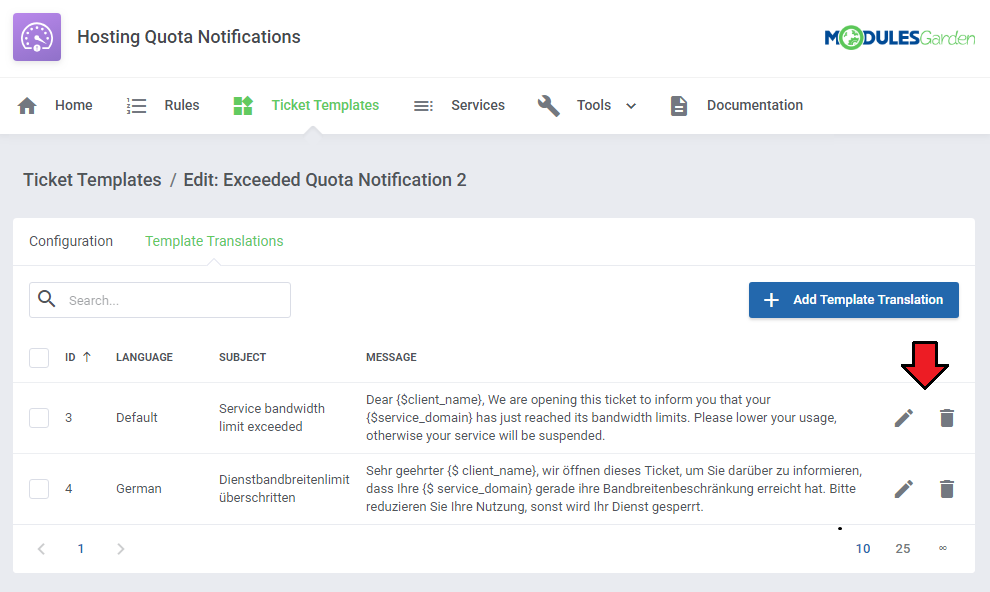
|
| That is how such an automatically opened ticket may look like in your client's area. |
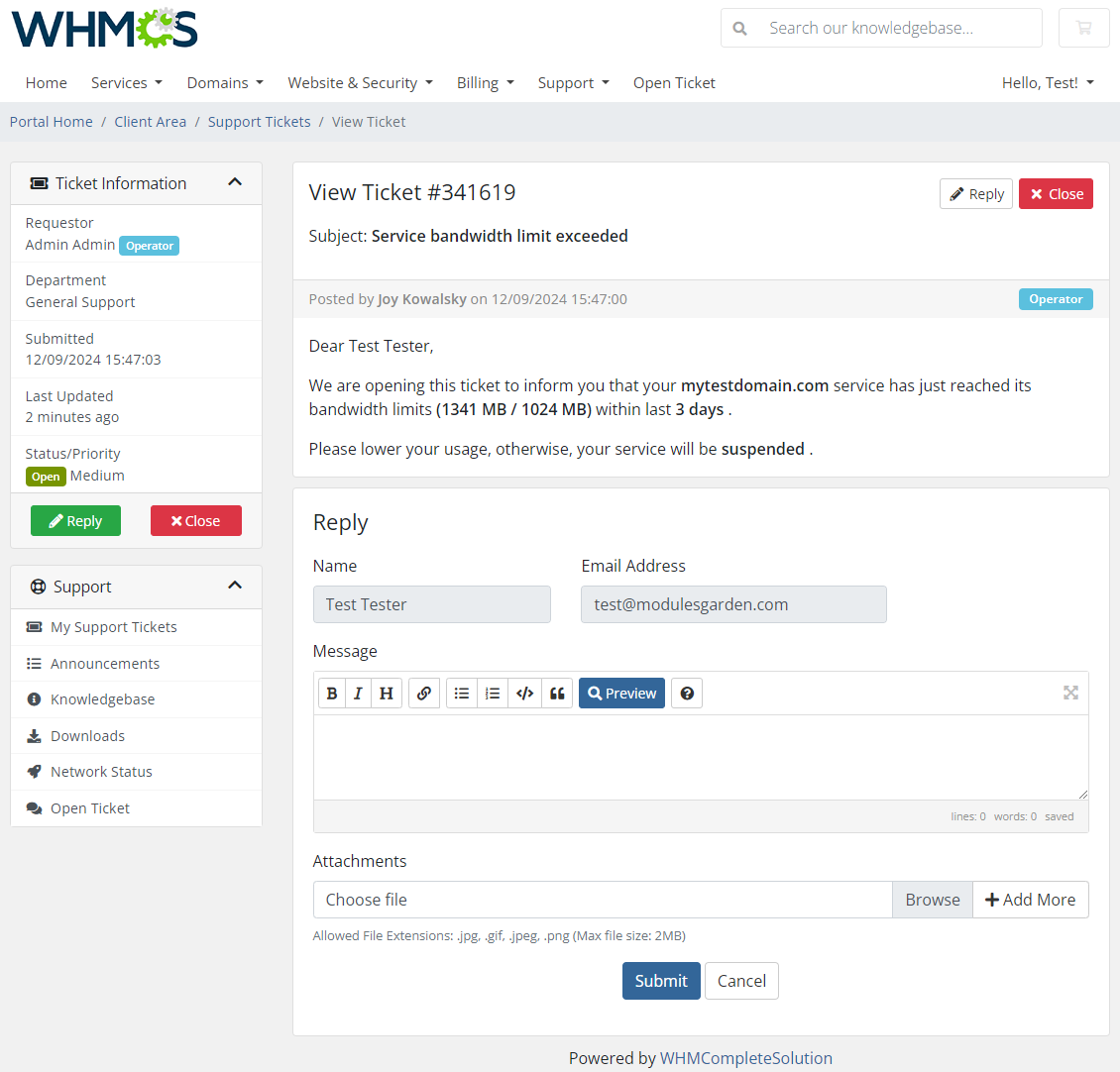
|
Services
| Another section that we need to draw your attention to is called 'Services'. You will find there products which are included in any of your configured rules with disk or bandwidth usage. Press the icon marked on the screen below and you will get details on the current resource usage of the service per each day. |
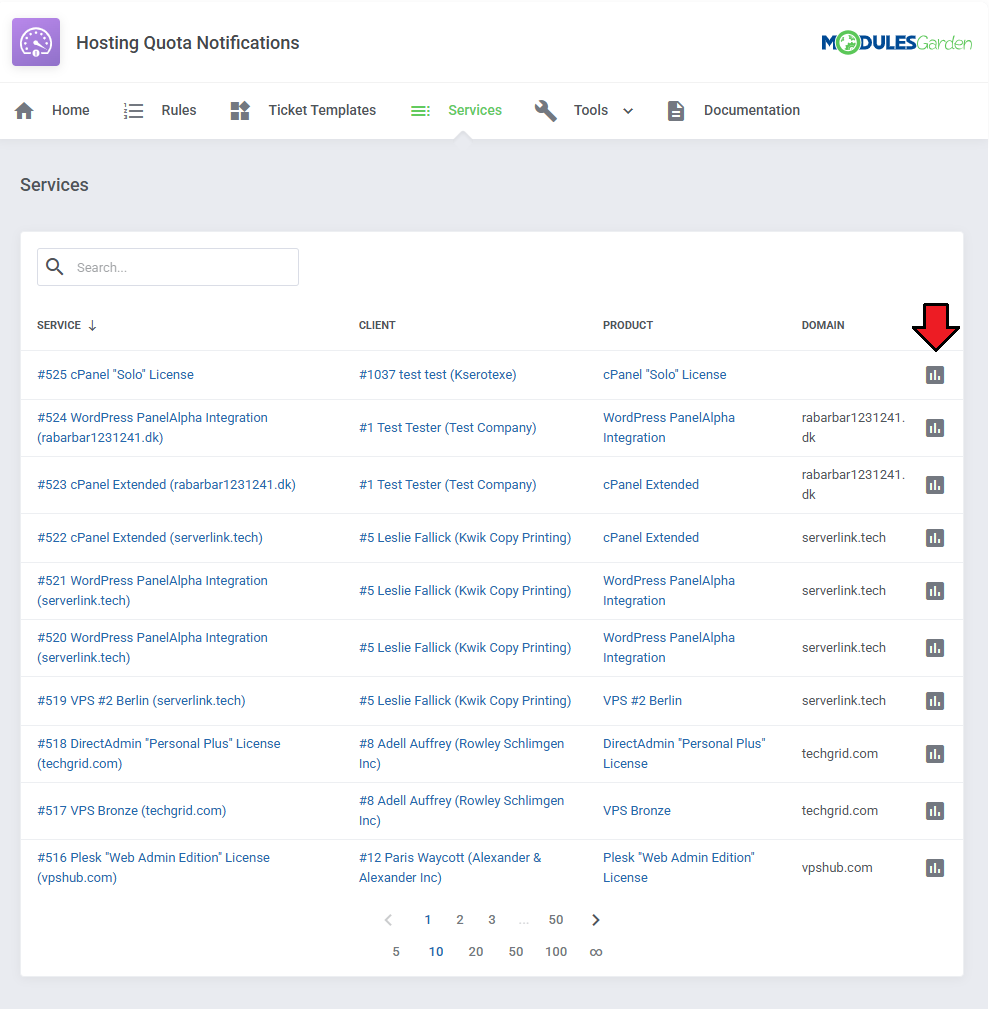
|
| Check out the statistics on the disk and bandwidth usage per single product. Please note that WHCMS updates the quote and traffic load once a day only. |
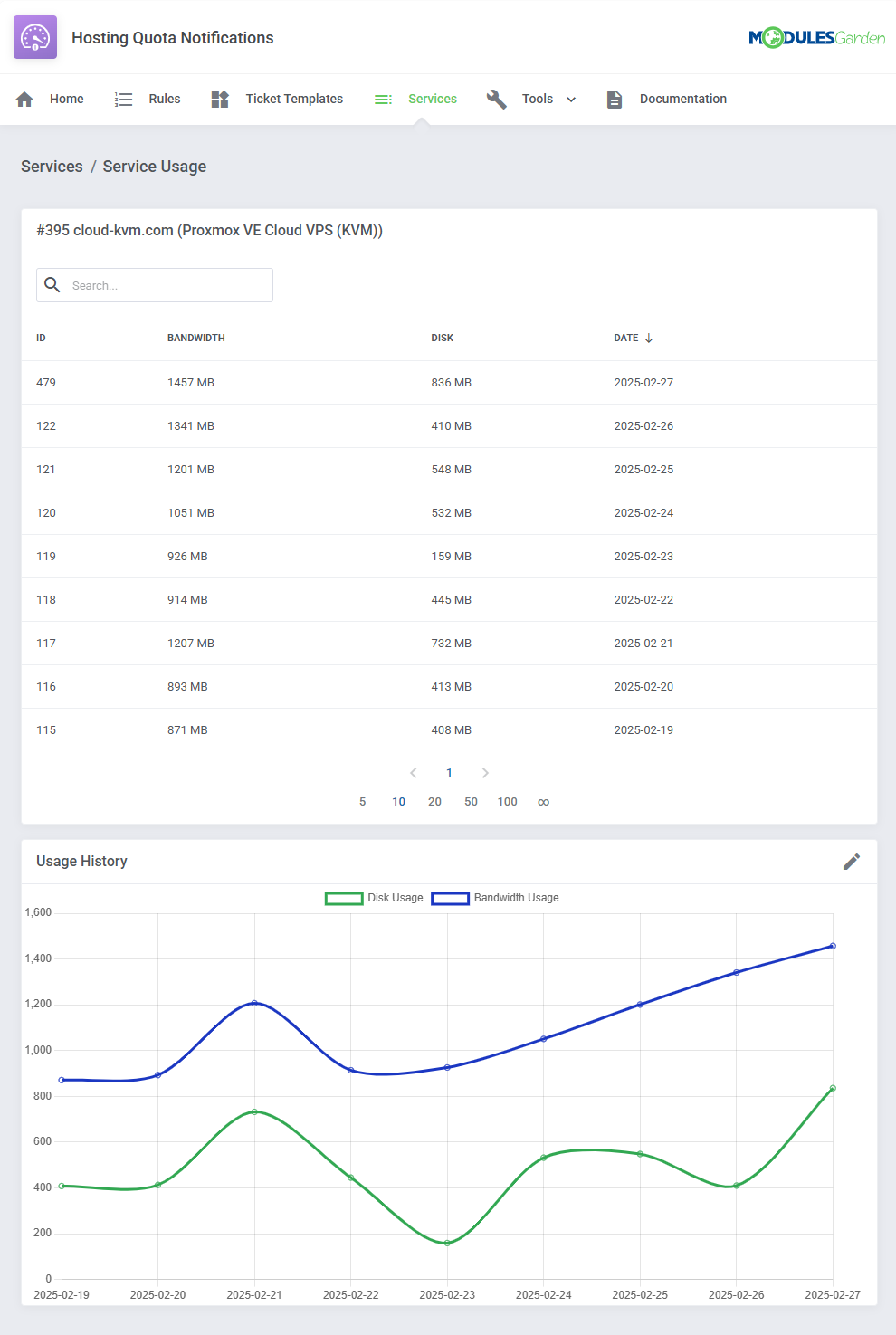
|
Logs
| Under 'Logs' page you can view information about sent notifications via email, opened tickets, errors, performed actions etc. |
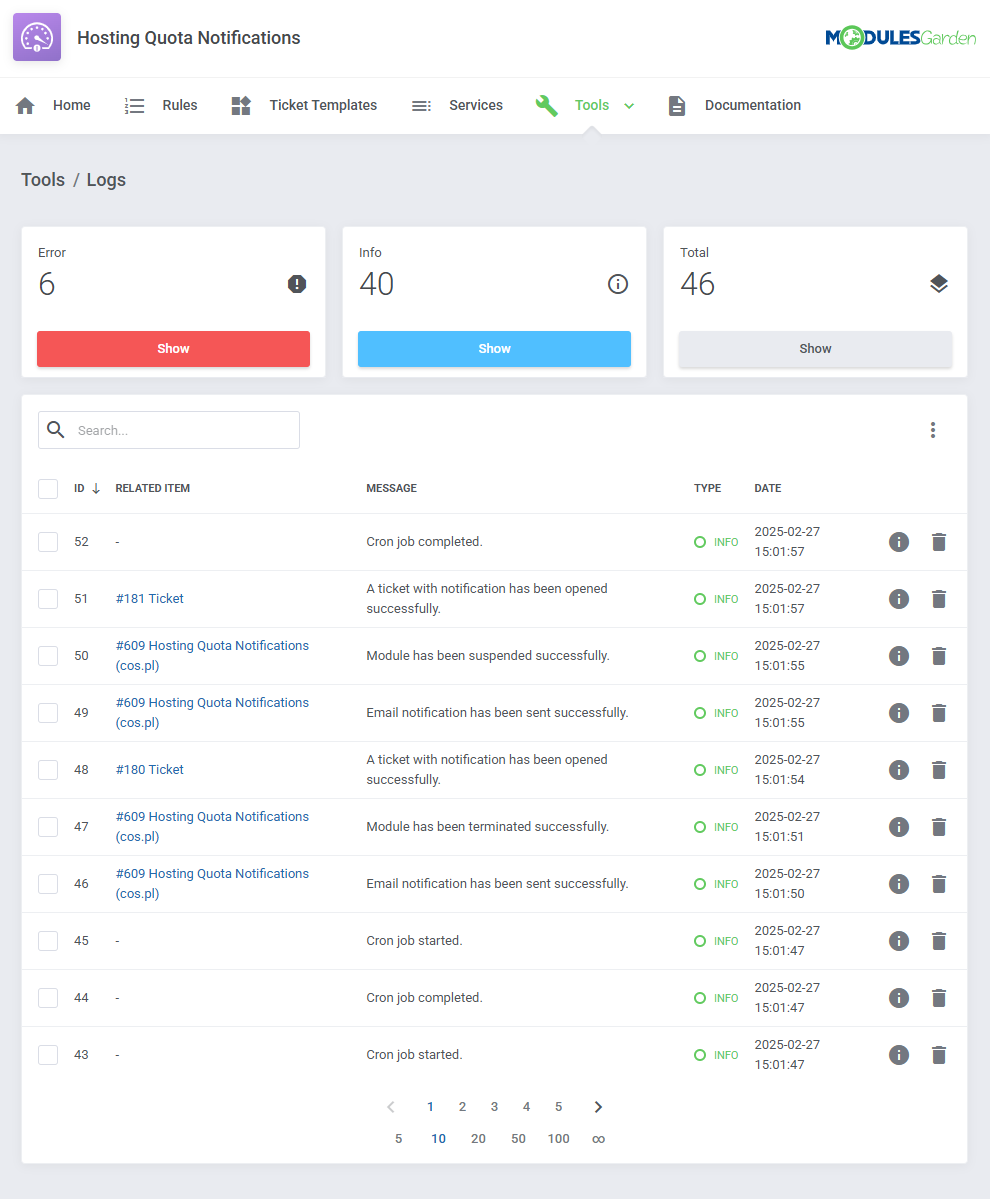
|
Tips
| 1. There is one default email template that may be used to send email notifications. Find 'Service Usage Limits Notification' at WHMCS → Setup → Email Templates → Product/Service Messages. You may edit the template freely, using special merge fields and create new ones on its basis. Allowed module special merge fields:
|
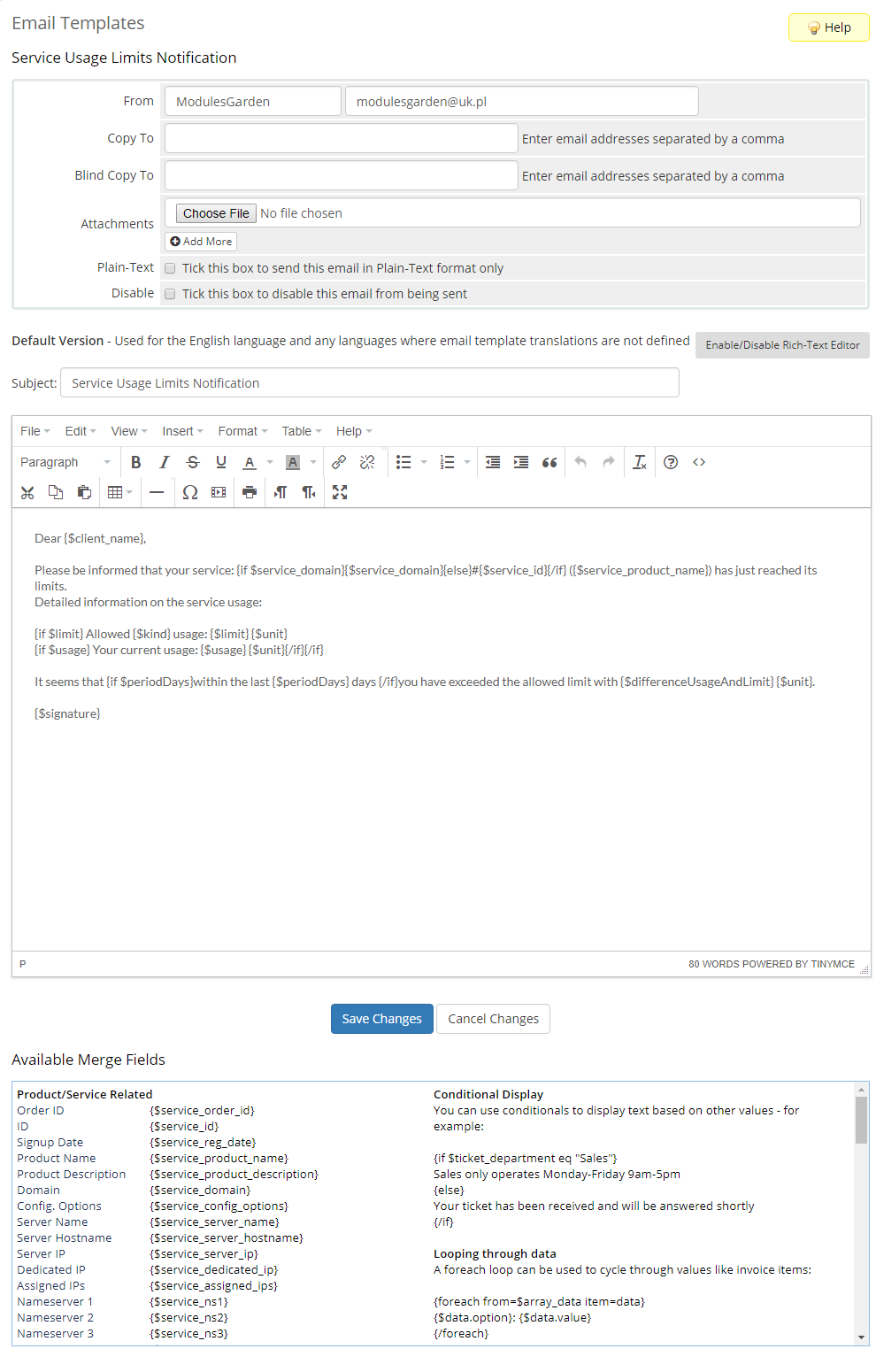
|
| That is how the email message may look like when delivered: |
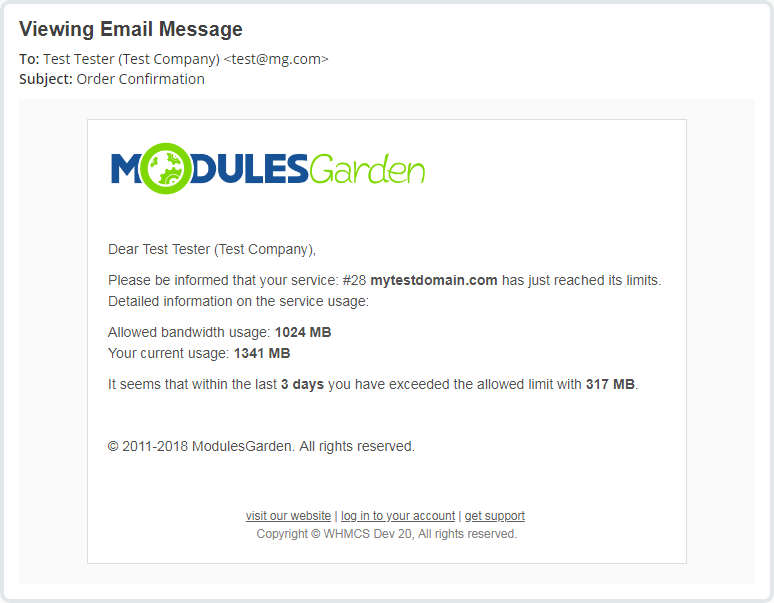
|
| 2. When configuring a ticklet template you need to select an admin to which it will be assigned. However, the ticket will be automatically opened by a randomly selected administartor. |
Update Instructions
| Essential guidance through the process of updating the module is offered here. Keep in mind there is a quick and easy option in our client area that will let you upgrade the license of your module to an open source version at any time - and at a lower price! |
| Important If you are updating your Hosting Quota Notifications module form version 1.0.0 to 1.1.0 please be noted that all data except logs will be migrated. |
Common Problems
| 1. When you have problems with connection, check whether your SELinux or firewall does not block ports. |
| 2. We do not recommend using Hosting Quota Notifications For WHMCS module either with Multibrand For WHMCS or with Resellers Center For WHMCS. Integration between these modules is hampered due to specific features of each one of them and their individual work flow. |